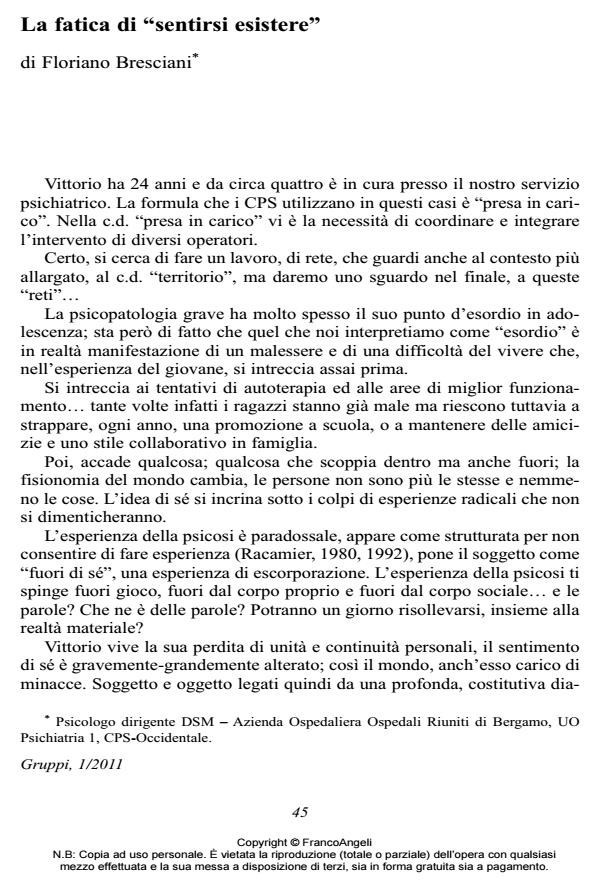The strain of "feeling one’s own existence"
Journal title GRUPPI
Author/s Floriano Bresciani
Publishing Year 2012 Issue 2011/1
Language Italian Pages 7 P. 45-51 File size 178 KB
DOI 10.3280/GRU2011-001005
DOI is like a bar code for intellectual property: to have more infomation
click here
Below, you can see the article first page
If you want to buy this article in PDF format, you can do it, following the instructions to buy download credits

FrancoAngeli is member of Publishers International Linking Association, Inc (PILA), a not-for-profit association which run the CrossRef service enabling links to and from online scholarly content.
In this work the author tries to identify various levels of specificity regarding therapeutic work in institutional settings (CPS) with young people suffering from psychotic disorders. The work especially raises the awareness that on one side this uneasiness in young people begins much earlier than during their so-called "debut", and on the other the belief that resorting to therapy cannot and must not be seen along the lines of an "institutional routine". The author highlights how the creativity of the group of caregivers plays a decisive role in setting the treatment of these human situations in a space/time span that aims to curb panic and anxiety disorders and to redefine/renegotiate meaning. The above-mentioned work is shared and stems from cooperation and understanding of the individual evolutionary and psychopathological conditions. The "Job Time" experience leads to the realization of a therapeutic group that allows to trace and remodel the characteristics of adolescence, which is caught in a spiral of radical, intense experiences such as those of delirium. The need for confidence can thus be integrated with the need to feel alive and active, so as to resume working on the subjectivization and redefinition of Self. Cooperation with doctors and nurses has proved crucial in understanding and meeting the different needs the young patients demonstrate. During times in which different forms of "therapeutic latency" occurs, cooperation allows for the recovery of signs of emancipation and change. The pleasure of words, of speaking - which fosters exchange and an empowered relationship with the world - remains the basic therapeutic setting.
Keywords: Psychosis (severe psychopathology), adolescence, therapeutic dialogue, tracing, group, subjectivity.
Floriano Bresciani, La fatica di "sentirsi esistere" in "GRUPPI" 1/2011, pp 45-51, DOI: 10.3280/GRU2011-001005